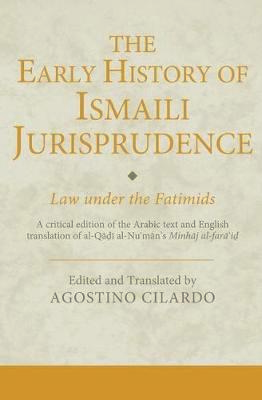Researchers have shed light on the literary production of the IsmailisAdherents of a branch of Shi’i Islam that considers Ismail, the eldest son of the Shi’i Imam Jaʿfar al-Ṣādiq (d. 765), as his successor. since the early 1930s. The cataloguing of these work has been carried out by Ivanow, Fyzee, Goriawala, Poonawala, Gacek, Cortese and de Blois. Many works attributable to Ismaili scholars, however, are still unavailable either because they remain hidden in private collections or because they have not survived.
Ismaili law, in particular, is still a largely unexplored field of study. Al-Qāḍī Abū Ḥanīfa al-Nuʿmān is generally considered the founder and greatest exponent of Ismaili jurisprudence, Many of his works have been lost, and information on some others is scattered; yet other works remain in manuscript form, and only a few have been published. The present book is a critical edition and translation of al-Nuʿmān’s Minhāj al-Farāʾiḍ, based on its three known copies. It deals with the law of inheritance, one of the most complex in Islamic law.
In comparing the Minhāj with two published works (the Daʿaʾim al-Islām and Kitāb al-iqtiṣār) as well as a manuscript (Mukhtaṣar al-āthār) of al-Nuʿmān, a significant doctrinal evolution clearly emerges, reflecting his early Mālikī training and then his work under four Fatimid imams. Ismaili law is also compared with the doctrines of the Imāmī school as well as the legal system of the four Sunni schools.
This book thus allows us to determine the time of the composition of the Minhāj al-Farāʾiḍ, the development and the originality of Ismaili jurisprudence, and its relation to other schools of law.
Acknowledgements
Introduction
1. The life and works of Al-Qadi Abu Hanifa al-Nu‘man
2. Differences among al-Nuʿmān’s five Ismaili works, and a comparison of their doctrines with Imāmī and Sunni doctrines on inheritance
Conclusion
Note on the edition
Translation of the Minhāj al-farāʾiḍ
Bibliography
English Index
Arabic Index
Arabic Text
Agostino Cilardo is a Full Professor at the ‘Orientale’ (Naples), where he has been the Dean of the Faculty of Arabic-Islamic and Mediterranean Studies. he is the editor of Studi Magrebini (Naples) and of the series ‘Arabic-Islamic Culture’ (Naples). He is a member of the editorial Board of the Journal of Arabic and Islamic Studies and of the Honorary Scientific Board of Studia Asiatica.
A specialist in Islamic law, Professor Cilardo has authored several books, including Teorie sulle origini del diritto islamico (Rome, 1990), Diritto ereditario islamico delle scuole giuridiche ismailita e imamita. Casistica (Rome, 1993), Diritto ereditario islamico delle scuole giuridiche sunnite (hanafita, malikita, shafiʿita e hanbalita) e delle scuole giuridiche zaydita, zahirita e ibadita. Casistica (Rome, 1994), Il diritto islamico e il sistema giuridico italiano. Le bozze di intesa tra la Repubblica Italiana e le Associazioni islamiche italiane (Naples, 2002), The Qurʾānic Term Kalāla: Studies in Arabic Language and Poetry, Ḥaḍīṯ, Tafsīr and fiqh—Notes on the Origins of Islamic Law (Edinburgh, 2005), and Due sistemi a confronto. La famiglia nellʾislam e nel diritto canonico (with Francesco Mennillo (Padua, 2009).
He has also edited several books, including Atti del Convegno sul tema: Presenza araba e islamica in Campania (Napoli-Caserta, 22–25 Novembre 1989) (Naples, 1992) and La tutela dei minori di cultura islamica nellʾarea mediterranea. Aspetti sociali, giuridici e medici (Naples, 2011).

